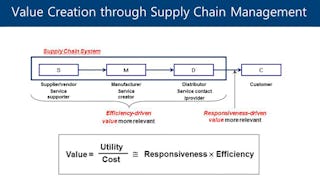Filter by
SubjectRequired
LanguageRequired
The language used throughout the course, in both instruction and assessments.
Learning ProductRequired
LevelRequired
DurationRequired
SkillsRequired
SubtitlesRequired
EducatorRequired
Explore the Greek Mythology Course Catalog
 Status: Free
Status: FreeUniversità Bocconi
Skills you'll gain: Project Finance, Risk Analysis, Capital Budgeting, Financial Analysis, Investment Banking, Private Equity, Lending and Underwriting, Credit Risk, Risk Management, Investments, Finance, Loans, Contract Management, Financial Management, Banking
 Status: Free
Status: FreeKorea Advanced Institute of Science and Technology(KAIST)
Skills you'll gain: New Product Development, Supply Chain, Supply Chain Management, Supply Chain Planning, Innovation, Quality Management, Operations Management, Product Development, Logistics Management, Supplier Management, Transportation, Supply Chain, and Logistics, Inventory Management System, Coordinating, Value Propositions, Operational Efficiency, Continuous Improvement Process, Consumer Behaviour, Cross-Functional Collaboration, Complex Problem Solving
 Status: Free
Status: FreeYale University
Skills you'll gain: Health Systems, Epidemiology, Health Care, Infectious Diseases, Socioeconomics, Health Assessment, Preventative Care, Environment Health And Safety, Economic Development, Demography, Emergency Response, Governance
 Status: Free
Status: FreeThe University of North Carolina at Chapel Hill
Skills you'll gain: Environmental Policy, Law, Regulation, and Compliance, Pollution Prevention, Environment and Resource Management, Natural Resource Management, Water Resources, Risk Analysis, Social Justice, Research

École Polytechnique Fédérale de Lausanne
Skills you'll gain: Scala Programming, Programming Principles, Object Oriented Programming (OOP), Functional Design, Software Design Patterns, Computer Programming, Data Structures, Software Engineering, Javascript, Algorithms, Computational Thinking

University of Minnesota
Skills you'll gain: Open Web Application Security Project (OWASP), Software Testing, Selenium (Software), Gherkin (Scripting Language), JUnit, Verification And Validation, Test Automation, Unit Testing, Security Testing, Regression Testing, Test Case, Software Development Tools, Testability, Behavior-Driven Development, Code Coverage, Performance Testing, Development Testing, Software Engineering Tools, Test Planning, Acceptance Testing
 Status: Free
Status: FreeYale University
Skills you'll gain: Contract Review, Contract Management, Law, Regulation, and Compliance, Policty Analysis, Research, and Development, Economics

Georgia Institute of Technology
Skills you'll gain: Basic Electrical Systems, Electronic Components, Electrical Engineering, Engineering Analysis, Engineering Calculations, Physics, Differential Equations, Applied Mathematics, Schematic Diagrams, Calculus, Mathematical Modeling

Skills you'll gain: NoSQL, Apache Hadoop, Apache Spark, MongoDB, PySpark, Machine Learning Methods, Apache Hive, Databases, Machine Learning Algorithms, Apache Cassandra, Big Data, Machine Learning, Generative AI, IBM Cloud, Applied Machine Learning, Kubernetes, Supervised Learning, Distributed Computing, Docker (Software), Database Management

Kennesaw State University
Skills you'll gain: Quality Improvement, Lean Six Sigma, Lean Methodologies, Six Sigma Methodology, Process Improvement, Operational Excellence, Quality Management, Lean Manufacturing, Process Analysis, Business Process, Eight Disciplines Problem Solving (8D), Project Management, Project Design, Root Cause Analysis, Customer Analysis

Duke University
Skills you'll gain: Persuasive Communication, Research, Interpersonal Communications, Interactive Learning

University of Illinois Urbana-Champaign
Skills you'll gain: Strategic Decision-Making, Innovation, Creativity, Team Management, Creative Thinking, Value Propositions, Entrepreneurship, Creative Problem-Solving, Technology Strategies, Brainstorming, Presentations, Business Modeling, Go To Market Strategy, Business Planning, Collaboration, New Business Development, Open Mindset, New Product Development, Market Opportunities, Curiosity
Greek Mythology learners also search
In summary, here are 10 of our most popular greek mythology courses
- Financing and Investing in Infrastructure: Università Bocconi
- Supply Chain Management: A Learning Perspective : Korea Advanced Institute of Science and Technology(KAIST)
- Essentials of Global Health: Yale University
- Introduction to Environmental Law and Policy: The University of North Carolina at Chapel Hill
- Functional Programming Principles in Scala: École Polytechnique Fédérale de Lausanne
- Software Testing and Automation: University of Minnesota
- American Contract Law I: Yale University
- Linear Circuits 1: DC Analysis: Georgia Institute of Technology
- NoSQL, Big Data, and Spark Foundations: IBM
- Six Sigma and the Organization (Advanced): Kennesaw State University










